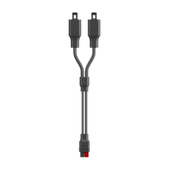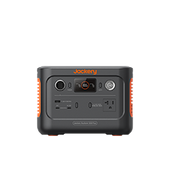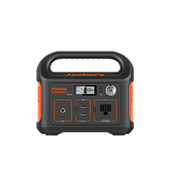Your phone, computer, laptop, car, and power stations feature a battery. But have you wondered about the number and ratings like 5Ah or 10Ah written on it? What does Ah mean on a battery? Simply put, Ah or amp-hours is the amount of energy charged in a battery representing 1 ampere of current flow in one hour.
Large batteries have a high Ah value, meaning they can power devices for long hours. Jackery is the top brand offering different sizes of Explorer Portable Power Stations with varied battery capacities. The robust and powerful batteries can charge appliances for long hours before depletion. In this blog, we will focus on what Ah means in detail.
What Is An Ampere Hour (Ah)?
Amps, short for amperage, is the rate at which electrons flow through an object or conductor. The higher the amps, the greater volume of electrons passes through the conductor.
On the other hand, amp-hours is the unit that measures the battery capacity. The rating measures the amount of current that a battery can provide at a specific rate for a particular time. A milliamp-hour is the 1000th of an ampere-hour, generally used to represent the battery capacity of small devices.
The crucial role of understanding “what does an Ah mean” is to learn how long your device will run after one charge.
The Use Of Ah
Ampere hour is typically used when you decrease the nominal voltage in electrochemical systems like electroplating.
In these devices, the plating thickness and integration of current over a specific time are directly proportional.
An ampere-hour meter is generally used to measure the Ah rating and determine the quality and reliability of the electroplating application.

What Does Ah Mean On A Battery?
Ah, or amp-hour, describes the capable charge of a battery. The rating lets customers understand how many amps a battery can provide for one hour.
For instance, a fully charged 10Ah battery is capable of providing 10 amps of current for one hour. That said if the device requires one amp of current to function, the full charge will keep the gear powered for ten hours.
However, it’s worth noting that this happens under ideal conditions. If the temperature and weather conditions vary, the number of running hours of the appliance will differ.
Battery Capacity
Battery capacity is the measure of the charge stored by the battery. It is measured in amp-hour. Below we have included the typical battery capacity and voltage of different cylindrical AA batteries.
|
Chemistry |
Common Name |
Rechargeable |
Typical Capacity (mAh) |
Voltage (V) |
|
Alkaline |
LR6, 15A |
No (Mostly No) |
1800 - 2700 |
1.5 |
|
Li-ion |
14500 |
Yes |
600 - 2000 + |
3.6 - 3.7 |
|
Li-Fe |
FR6, 15LF |
No |
2700 - 3300 |
1.5 (1.8 max) |
|
Li-FeP |
IFR14500 |
Yes |
500 - 750 |
3.2 |
|
Li-SOC |
(14505) |
No |
2400 - 2700 |
3.5 - 3.6 |
|
Li-Mn |
CR AA |
No |
~ 2000 |
3.0 |
|
Lithium |
- |
Yes |
1000 - 2000+ |
1.5 |
|
NiCd |
KR6, 1.2K2 |
Yes |
600 - 1200 |
1.2 |
|
NiMH |
HR6, 1.2H2 |
Yes |
700 - 2800 |
1.2 |
|
NiOOH |
- |
No |
2200 - 2700 |
1.5 (1.7 max) |
|
NiZn |
ZR6 |
Yes |
1500 - 1800 |
1.6 - 1.65 |
|
Zinc Carbon |
R6, 15D |
No |
600 - 1600 |
1.5 |
How To Calculate Ah On A Battery?
Now that you know “what does an Ah mean on battery” theoretically, it’s time to understand how to calculate it.
The mathematical representation of Ah is:
Amp Hour (Ah) = Current (I) × Discharge Time (T)
Suppose you have a battery that pulls nearly 50 amps and is discharged in 1 hour. Then, the ampere-hour can be calculated as follows:
Ampere Hour = 50 A × 1 H = 50Ah for 1 hour.
Let us take another example to understand better.
Suppose a battery pulls 60 amps, discharged in 0.5 hours or 30 minutes. In this case, the ampere-hour will be:
Ampere Hour = 60 A × 0.5 H or 30 A × 1 H = 30Ah for 1 hour.
In the first example, the battery will supply 50Ah for one hour. The second battery pulling 60 amps, will provide 30Ah for one hour.
Batteries with less amperage are usually depleted faster, leading to less lifespan. Therefore, it’s ideal to buy a battery with a high Ah rating.
Understand Ah Ratings
When comparing batteries, you will need to check the amp hour on the battery. For deep-cycle batteries, the Ah rating is displayed on the battery itself. If you cannot find the amp hour rating on the battery, chances are it’s the starting battery that does not provide continuous power.
Generally, high-rated batteries have a high volume of electrolytes and highly active electrodes. For instance, a lithium-ion car battery is rated higher than a standard AAA battery. There are different battery amp-hours available. The more common among them include:
- 50Ah
- 100Ah
- 200Ah
Instead of buying a smaller Ah-rated battery to charge appliances, it’s better to choose a larger one. For instance, if you require a 150Ah battery, it’s ideal to choose 200Ah rather than 100Ah.
2Ah Vs. 5Ah Battery
Five cells of 3.6V, 2Ah are combined to form an 18V (or maximum 20V), 2Ah battery. The cells are connected in series so that their amp hour rating remains the same and voltage gets combined. The battery rating, in this case, is 18V and 2Ah.
On the other hand, two different packs of 5 cells (3.6V, 2.5Ah) are connected in series. Each package of five cells then combines in parallel with each other, creating a battery of 18V and 5Ah. As the cells are connected in parallel, their amp rating gets combined — 5 Ah.

Even though the higher amp rating does not mean high power, you can expect a bit more power from the larger battery. The reason is that in a 10Ah battery, there are 10 cells doing their job. Hence, it can supply continuous and stable power to the appliance.
Understand Ah Ratings With Jackery
AC amps and DC amps are measurements of electricity flow through the circuit. However, the difference lies in the flow of electrical current.
DC amps refer to the electricity flow in only one direction. On the other hand, AC amps change direction while moving from the positive (+) to the negative ( – ) terminal and then back again.
Batteries are always DC. Therefore they come with a DC to AC inverter to convert electricity into a usable form. Below are the most popular Jackery Explorer Portable Power Stations with a pure sine wave inverter.
Jackery Explorer 3000 Pro Portable Power Station
Jackery Explorer 3000 Pro Portable Power Station has a large-capacity lithium-ion battery with a 3024Wh rating. It can power around 99% of outdoor appliances and feature a smart app control to improve power efficiency. In addition, it has an amp hour rating of 70, ensuring you can power devices for long hours.

|
Power Station |
Capacity |
Recharging Time |
Ports |
Appliances |
|
Jackery Explorer 3000 Pro |
NMC Battery 70Ah/ 43.2V DC (3024Wh) |
AC Adapter: 2.4H 12V Car Adapter: 35H 6x SolarSaga 200W Solar Panel: 3-4H 4x SolarSaga 200W Solar Panel: 5-6H 2x SolarSaga 200W Solar Panel: 9-10H 1x SolarSaga 200W Solar Panel: 18-19H |
4x AC Output: 120V~ 60Hz 20A Max 1x AC Output: 120V~ 60Hz 25A Max 2x USB-C Output: 100W Max, 5V⎓3A, 9V⎓3A, 12V⎓3A, 15V⎓3A, 20V⎓5A 2x USB-A Output: Quick Charge 3.0, 18W Max, 5-6V⎓3A, 6-9V⎓2A, 9-12V⎓1.5A Carport: 12V,10A Max AC Input: 120V, 60Hz, 15A Max DC Input: 2x DC 8mm Ports: 11-17.5V (Working Voltage)⎓8A Max, Double to 8A Max; 17.5-60V (Working Voltage)⎓12A, Double to 24A/1400W Max |
Refrigerator (500W) - 4.7H TV (60W) - 29.2H Light (5W) - 82.7H Heater (1800W) - 1.4H Microwave (960W) - 2.5H Electric Grill (850W) - 2.8H Coffee Machine (1000W) - 2.4H |
Please note that this calculation is for reference purposes only and the actual runtime may vary from that mentioned above.
Jackery Explorer 2000 Plus Portable Power Station
The Jackery Explorer 2000 Plus Portable Power Station is a powerful and durable charging solution that can charge 99% of household or outdoor appliances, such as refrigerators, TVs, lights, lamps, etc. It can be connected to the home's electricity system with the Jackery Manual Transfer Switch to ensure 20ms EPS. The emergency power supply ensures essential appliances such as refrigerators and CPAP machines remain powered in the blink of an eye during sudden blackouts.
|
Power Station |
Capacity |
Recharging Time |
Ports |
Appliances |
|
Jackery Explorer 2000 Plus |
LiFePO4 Battery 44.8V/45.6Ah (2042.8Wh) |
AC Adapter: 2H 12V Car Adapter: 25H 6x SolarSaga 200W Solar Panel: 2H |
AC Output(×4) 120V~ 60Hz, 20A Max AC Output(×1) 120V~ 60Hz, 25A Max USB-A Output(x2): Quick Charge 3.0, 18W Max USB-C Output(x2): 100W Max, (5V, 9V, 12V, 15V, 20V up to 5A) Car Port(x1): 12V⎓10A |
Ice Shaver (700W) - 2.3H Coffee Maker (1120W) - 1.5H Mini Fridge (90W) - 14.6H Lamp (5W) - 55.8H TV (60W) - 19.7H Microwave Oven (1000W) - 1.6H Rice Cooker (530W) - 3.0H |
Jackery Explorer 1000 Plus Portable Power Station
The Jackery Explorer 1000 Plus Portable Power Station is ideal for someone looking for a reliable charging solution for brief power outages or outdoor adventures. It has a compact design with a foldable handle that ensures easy movement anywhere you go. You can also expand the battery capacity from 1.2kWh to 5kWh with the add-on Jackery Battery Pack 1000 Plus.
|
Power Station |
Capacity |
Recharging Time |
Ports |
Appliances |
|
Jackery Explorer 1000 Plus |
LiFePO4 Battery 30.4Ah/41.6V (1264Wh) |
AC Adapter: 1.7H 12V Car Adapter: 7H 2x SolarSaga 100W Solar Panel: 9H 4x SolarSaga 200W Solar Panel: 2H |
AC Output(x3): 120V~60Hz, 2000W (4000W Peak) USB-A Output(x2): 18W Max, 5-5V⎓3A USB-C Output(x2): 100W Max, (5V, 9V, 12V, 15V, 20V up to 5A) Car Port(x1): 12V⎓10A |
Ice Shaver (700W) - 1.5H Coffee Maker (1120W) - 54 min Mini Fridge (90W) - 9.7H Lamp (5W) - 45.6H TV (60W) - 13.5H Microwave Oven (1000W) - 1.0H Rice Cooker (530W) - 1.9H |
What Does Ah Mean On A Battery FAQs
Does a higher Ah battery mean more power?
In a word, no. A high Ah battery rating does not mean it is more powerful. Instead, it means there is a high number and density of cells providing current. When the electrical current moves with less resistance, it produces little more power.
What does 100Ah mean on a battery? How long will a 100Ah battery last?
A 100Ah battery can supply a load of 100 amps in one hour. Alternatively, it can provide 10 amps for 10 hours or 50 hours for 2 hours. How long a 100Ah battery runs will depend on the electricity requirements of the appliance, you charge.
How many watt-hours are in an amp hour?
Mathematically, watt hours equals amp hours multiplied by the battery voltage.
Watt hours = Amp hours × Voltage
Let us calculate the watt hours of Jackery Explorer 2000 Plus Portable Power Station with 44.8V and 45.6Ah.
Watt hours = 44.8V × 45.6Ah = 2042.8Wh.
Final Thoughts
We hope you have found the answer to “What does Ah mean on a battery.” Calculating the power needs of the appliance you wish to charge will help you choose the right-size battery capacity.
Jackery Explorer Portable Power Stations are available in different Ah and Wh ratings. For instance, the ultimate power station Jackery Explorer 3000 Pro, has a 70Ah rating, whereas Jackery Explorer 2000 Plus has 45.6Ah.
Depending on the electrical requirements of the appliance, you can invest in the right portable power station. Before you leave, subscribe to the Jackery newsletter to get all the latest news, exclusive deals, and promotional offers in your inbox.




















































































































Leave a comment